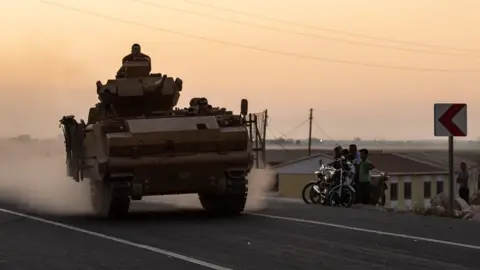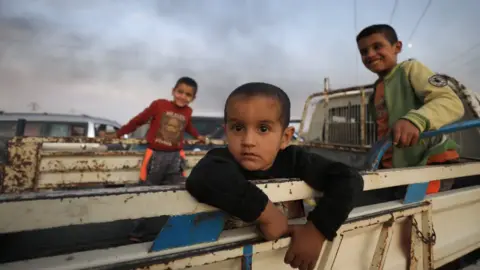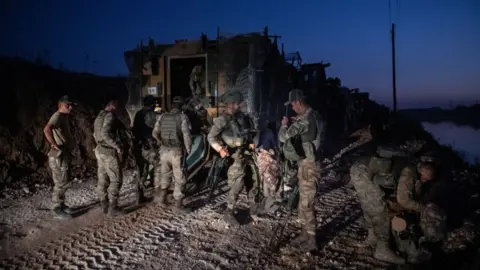US says it did not approve Turkey's Syria offensive
 Getty Images
Getty ImagesUS Secretary of State Mike Pompeo has denied the US gave Turkey a "green light" for its offensive in Syria.
Mr Pompeo defended President Donald Trump's widely criticised decision to withdraw US troops from the northern border area.
Turkey on Wednesday launched an assault on territory held by Kurdish-led forces - key allies of the US in the region.
President Recep Tayyip Erdogan said the aim was to "prevent the creation of a terror corridor" on the border.
Turkey said its plan was to create a "safe zone" cleared of Kurdish militias which will also house Syrian refugees.
But critics say the operation could lead to ethnic cleansing of the local Kurdish population in northern Syria and a revival of the Islamic State (IS) militant group.
Kurdish-led forces vowed to resist the offensive and have already clashed with Turkish troops.
The Kurds - who helped defeat IS in Syria and were key US allies in that fight - guard thousands of IS fighters and their relatives in prisons and camps in areas under their control. It is unclear whether they will continue to do so if battles break out.
The US military says it has taken custody of two British detainees notorious for their roles in an IS cell that tortured and killed nearly 30 Western hostages.
The two men, El Shafee Elsheikh and Alexanda Kotey, were part of a British cell nicknamed The Beatles.
They have now been removed from a prison run by the Kurdish-led militia in northern Syria.
What did Mr Pompeo say?
In an interview with US broadcaster PBS, Mr Pompeo defended Mr Trump's surprise decision to pull back US forces, adding that Turkey had a "legitimate security concern" and "a terrorist threat to their south".
He said reports the US had allowed Turkey to launch the offensive were "just false".
"The United States didn't give Turkey a green light," he said.
Allow X content?

In an earlier statement, Mr Trump - who had threatened to "obliterate" Turkey's economy if it went "off limits" - said the US did not "endorse this attack", calling the operation a "bad idea".
The president later told a news conference the Turks and Kurds had "been fighting each other for centuries", and said that Kurdish fighters "didn't help us in the Second World War, they didn't help us with [the D-Day landings in] Normandy".
"With all of that being said, we like the Kurds," Mr Trump added.


Transactional alliances
Even by President Trump's own remarkable standards his off-the-cuff remark that the US alliance with the Kurds is of little importance because they were not at Normandy, ie they did not fight with the US and its allies in World War Two, is extraordinary.
For Mr Trump alliances are simply transactional - business arrangements to be judged according to a brutal and short-term cost benefit analysis. What is the US giving and what is it getting in return?
In seemingly writing off the Kurds he suggests that the US can easily find other allies in the region. Really? Has he already forgotten recent history? The Kurds were the only capable and reliable local ally in the struggle against IS.
But what will Mr Trump do about Turkey who, incidentally, were not at Normandy either? This is fast becoming a major test of Turkey's standing within Nato, with many fearing it has become a far from reliable ally of the West.

Republicans and Democrats alike have condemned the decision to pull back US troops.
Senator Lindsey Graham - normally a staunch ally of Mr Trump's - said the US had "shamefully abandoned" its ally, and has unveiled a sanctions bill against Turkey with Democratic Senator Chris Van Hollen.
"While the Administration refuses to act against Turkey, I expect strong bipartisan support," he wrote.
What is the latest in Syria?
Several towns and villages were hit by air strikes and artillery fire on Wednesday, forcing thousands of civilians to flee their homes.
The Kurdish Red Crescent said at least seven civilians had so far been killed, two of them children, and at least 19 more critically injured including four children.
Turkey's defence ministry later announced that Turkish troops and Syrian rebel allies had entered the area "east of the Euphrates".
Turkish armed forces tweeted they had struck 181 "terrorist" targets as part of what has been dubbed Operation Peace Spring, while a pro-Turkish group told AFP news agency the offensive had begun in Tal Abyad, an area under YPG control.
Reports suggested there were heavy clashes around the town. SDF spokesman Mustafa Bali said their forces had repelled a ground incursion there, and that there was "no advance as of now".
Kurdish authorities have called for a general mobilisation and urged people to "head to the border with Turkey... to resist in this sensitive, historic moment".
The SDF also said one of the prisons holding IS fighters had been hit by a Turkish air strike. And amid growing humanitarian concerns, it asked the US-led coalition against IS to establish a no-fly zone to stop "attacks on innocent people".


Turkey considers the Kurdish YPG militia - the dominant force in the Syrian Democratic Forces (SDF) - an extension of the banned Kurdistan Workers' Party, which has fought for Kurdish autonomy in Turkey for three decades.
The Turkish government plans to send two million of the 3.6 million Syrian refugees living on its soil to the "safe zone". The offensive could displace 300,000 people living the area, the International Rescue Committee said.
It was thought the offensive - Turkey's third military operation in northern Syria in three years - would initially focus on a 100km (62-mile) stretch between Tal Abyad and Ras al-Ain, a sparsely populated, mainly Arab area.
Mr Bali said the towns of Kobane, to the west, and Qamishli, to the east, had been hit by Turkish shelling. If Turkish troops advance towards those towns they will have to move into densely populated, mainly Kurdish areas.
What has the international reaction been?
The EU said it was "unlikely that a so-called 'safe zone'... would satisfy international criteria for refugee return", while Belgium, France, Germany, Poland and the UK all requested a meeting of the UN Security Council to discuss the move.
All 15 members of the body will meet on Thursday. The Arab League also announced an emergency meeting to discuss the offensive on 12 October in Cairo.
 Reuters
Reuters Getty Images
Getty ImagesNato Secretary General Jens Stoltenberg said Turkey, a Nato member, had "legitimate security concerns" but that he expected the country to "act with restraint and to ensure that any action... is proportionate and measured".
In his statement, Mr Trump also said Turkey would be responsible for ensuring that suspected IS fighters being held captive remained in prison and that IS did not regroup.
How would an incursion affect the IS situation?
The SDF says it is detaining more than 12,000 suspected IS members in seven prisons, and at least 4,000 of them are foreign nationals. The exact locations have not been revealed, but some are reportedly close to the Turkish border.
Two camps - Roj and Ain Issa - holding families of suspected IS members are inside the "safe zone".

Are you in the affected area? If it is safe to do so contact us by emailing [email protected].
Please include a contact number if you are willing to speak to a BBC journalist. You can also contact us in the following ways:
- WhatsApp: +44 7756 165803
- Tweet: @BBC_HaveYourSay
- Send pictures/video to [email protected]
- Upload your pictures / video here
- Text an SMS or MMS to 61124 or +44 7624 800 100
- Please read our terms of use and privacy policy
